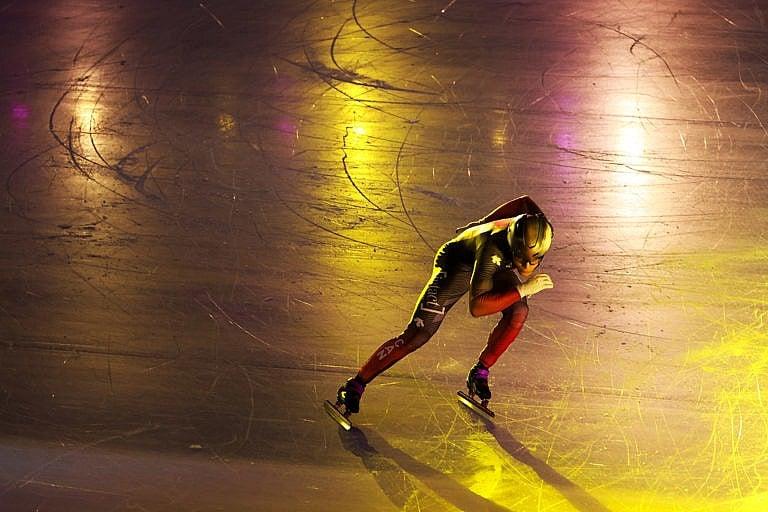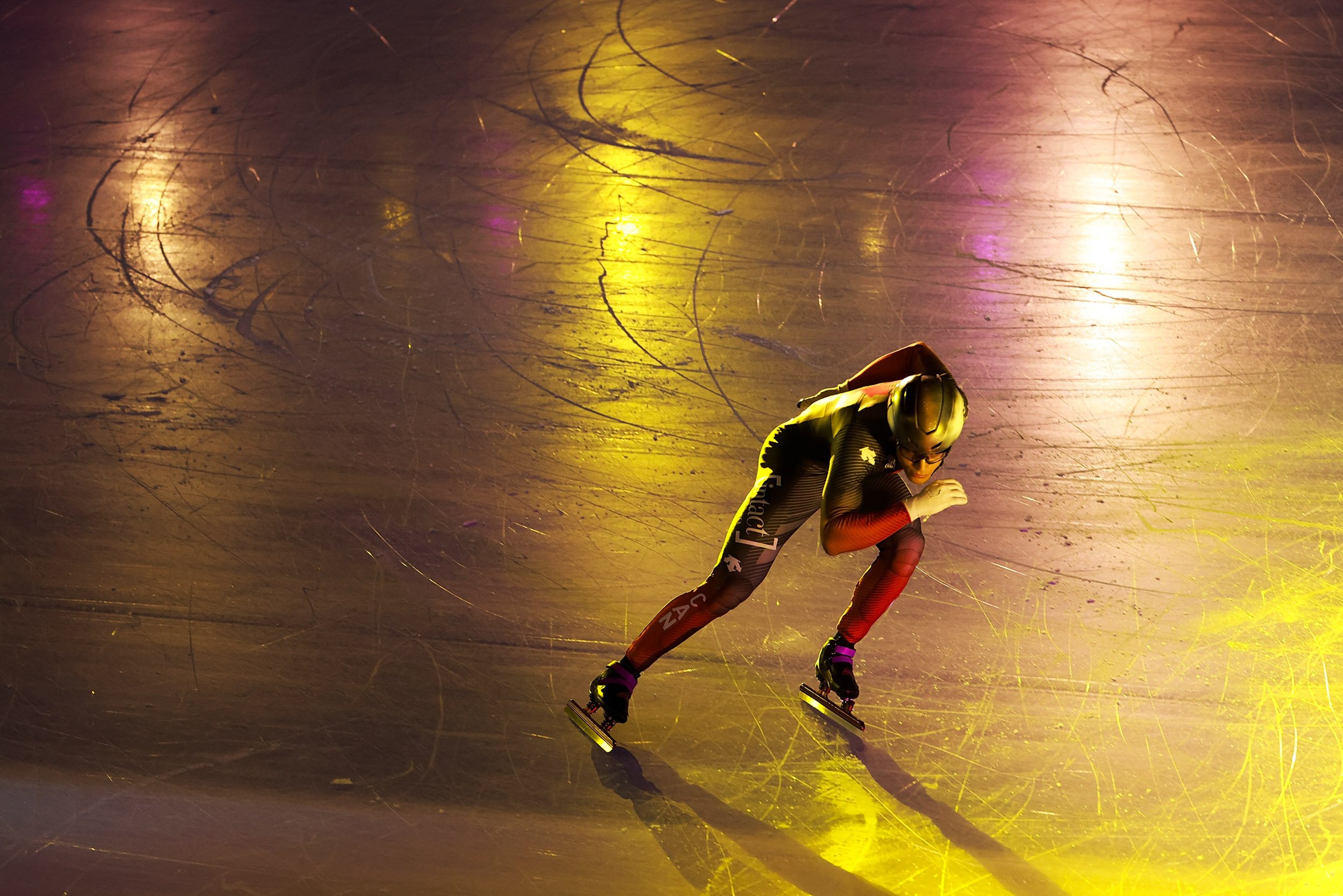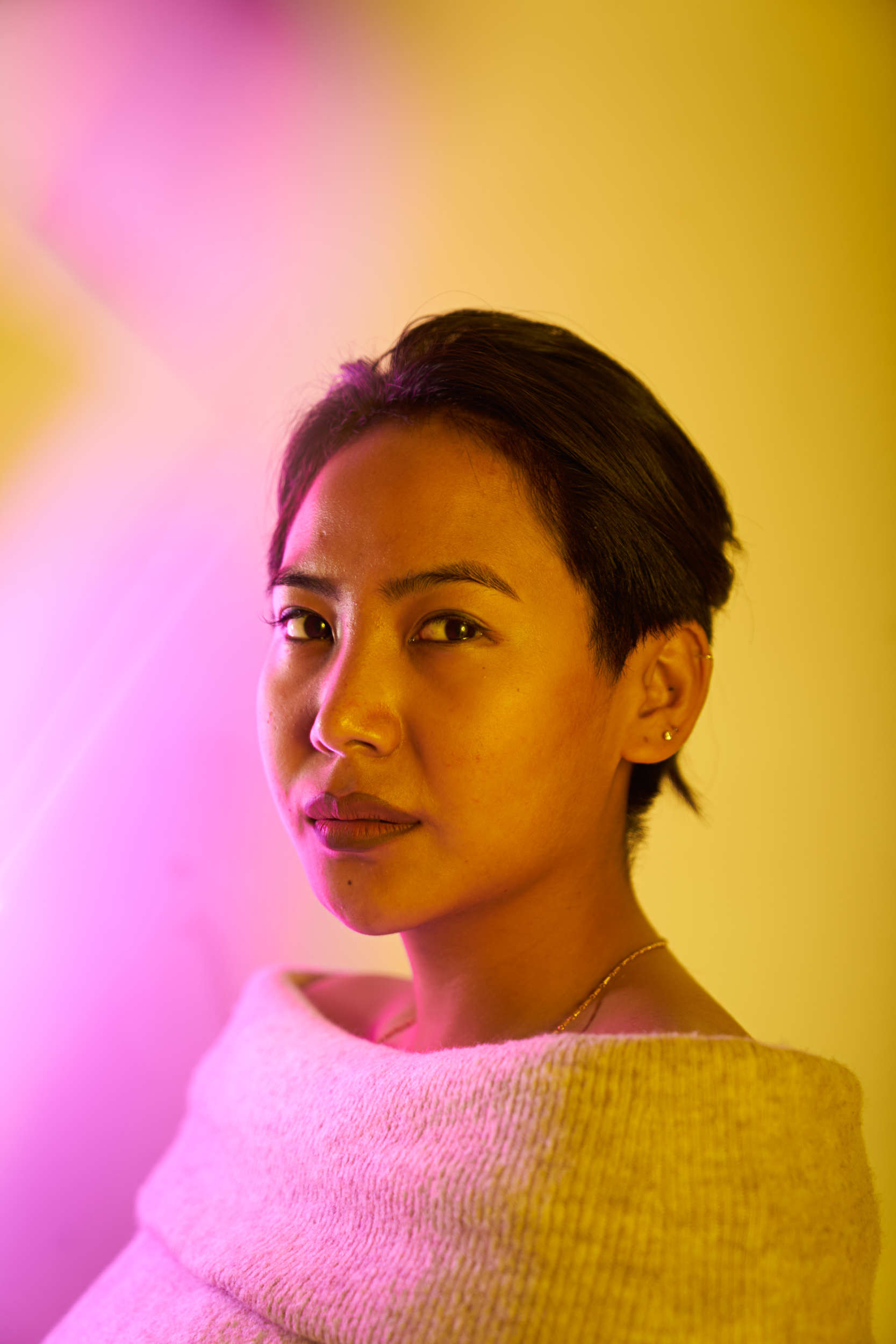Why is Canada playing in the 2022 Beijing Olympics?
The 2022 Winter Games are set to open in Beijing, but many Canadians believe our athletes should not be going

Speedskating trials last October in Beijing, a controversial choice as host city for the 2022 Winter Games (Lintao Zhang/International Skating Union/Getty Images)
Share

The Olympic flame-lighting ceremony was underway at the Temple of Hera, the oldest temple at Olympia in Greece, as Chemi Lhamo hid nearby, hoping security wouldn’t spot her. She listened quietly as the actor playing the role of high priestess offered a symbolic prayer to Apollo, the Greek god of light. She watched as the iconic torch was lit. She waited until the flautist stopped playing.
Then, amid the silence, Lhamo made her presence known. “How can Beijing be allowed to host the Olympics given that they are committing a genocide against the Uighurs?” the Canadian shouted.
She called out in support of Taiwan, as well as those persecuted in Hong Kong and her homeland of Tibet—until security whisked her away. “I didn’t realize how loud I was,” Lhamo said in an interview, a week after her protest in mid-October. “After three days in jail, I got to see a video [of the incident], and people could actually hear my voice. I truly believe that voice came from somewhere within, amplified by all of the oppressed people around the world.”
Lhamo has kept up her calls for the International Olympic Committee (IOC) to find a new host nation for the 2022 Games. And she’s not the only one making her voice heard. More than 160 human rights and advocacy groups delivered a joint letter to the IOC in September saying the reputation of the Games and the Olympic spirit will suffer if the event is held in China. In Canada, Bloc Québécois MP Alexis Brunelle-Duceppe spearheaded an open letter demanding a new location—and it earned multiparty support in the House of Commons. It condemned the Chinese government, stating that “close to two million Uighurs and Turkic Muslims are being held in concentration camps that Chinese authorities odiously refer to as ‘vocational training centres.’ ” It spoke of children being kidnapped, of women being sterilized and of cultural erasure.

“We are not asking our athletes to give up their Olympic dream, because we know full well how much effort will have gone into pursuing it,” the letter went on. “However, we believe that there is still time to demand that the International Olympic Committee move the Games to another country if the Chinese government continues its genocidal campaign.”
But with the Games slated to start in February, and the IOC steadfast in its decision to let the Chinese capital host them, many critics concede that a move is highly unlikely. Which leaves a question many Canadians are asking in the early weeks of 2022: should we be sending our athletes to Beijing at all?
“Canada should not be going,” says David Mulroney, Canada’s ambassador to China from 2009 to 2012. “I feel terrible for the athletes, but I feel worse for Uighurs who are imprisoned. There are no good outcomes here. But participating in the Games as a genocide is happening is profoundly wrong.”
RELATED: ‘Only athletes pay the price’: The COC president on the folly of boycotting the Beijing Olympics
The Trudeau government has ducked the issue, saying the Canadian Olympic and Paralympic committees operate independently of the government, and that the choice of whether to go to the Games lies with them. The COC has been resolutely in favour of Canada attending. Doing so will help “shine a light on these Games,” says CEO David Shoemaker, who adds: “It creates a global dialogue around issues, and our participation amplifies the conversation.”
The COC says it is committed to providing opportunities for athletes to express themselves freely, and to amplify their voices where they can. And the IOC has assured them that China will abide by Rule 50 of the Olympic Charter, says Shoemaker, which now allows athletes to protest so long as it’s not on the Olympic podium, at the opening or closing ceremonies, in the athletes’ village or on the field of play.
That leaves more space for dissent than you might think, including press centres and mixed zones where athletes speak to media. “Many athletes feel they can actually make more of a statement by going, and then tweeting or participating in social protests, rather than not being there at all,” says Angela Schneider, a former Olympic rower and now director of Western University’s International Centre for Olympic Studies. “China has a lot of power, but it doesn’t have control over an individual athlete’s Facebook account.”
MORE: At Michael Kovrig’s trial, the world had Canada’s back
Not everyone is convinced. MacIntosh Ross, a kinesiology professor at Western who has written frequently about Olympic boycotts, says giving Canadian athletes any assurance they can speak freely against human rights abuses in China is “a terrible idea.” “The IOC can’t protect them,” he warns. “They don’t have a military. They don’t have police. And all visitors are subject to the host nation’s laws.”
Ross has instead advocated for a diplomatic boycott of the Beijing Games, as the U.S. government announced earlier this week. “U.S. diplomatic or official representation would treat these games as business as usual in the face of the [People’s Republic of China] egregious human rights abuses and atrocities in Xinjiang,” explained White House press secretary Jen Psaki. “We simply can’t do that.”
As the Canadian government is reportedly mulling over joining such a boycott, Ross says broadcasters like the CBC could also boycott showcasing the Games on TV. But he too says Canada should not be sending athletes, a sentiment that a large number of his compatriots appear to share. An August poll from Nanos Research found that a majority either supported or somewhat supported a boycott. And while critics of such actions point to the 1980 Games in Russia, which didn’t end the Soviet invasion of Afghanistan, Ross counters with the massive, decades-long international sporting boycott of South Africa—an important tool, he says, that “put pressure on the apartheid government.”
What impression Canada’s absence from these Games would make on Beijing is an open question. Xi Jinping’s Communist regime responded with contempt to widespread Canadian outrage over the arrests of Michael Spavor and Michael Kovrig, who were detained for more than 1,000 days in China, and released only after Huawei CFO Meng Wanzhou’s house arrest in Vancouver ended. Less well-known is the plight of Uighur human rights activist Huseyin Celil, a Canadian citizen who was arrested in 2006 while visiting Uzbekistan and sent to China, where he’s been detained ever since—reportedly without a single consular visit.
READ: Inside the fight to bring the two Michaels home from China
One of Celil’s most vocal supporters in Canada says he’d “love to hear the athletes say they aren’t participating” in the Olympics. “The fact that we’re giving a genocidal regime the opportunity to take this very prestigious world event that is supposed to symbolize unity, dignity and peace—while they’re actively perpetrating genocide against Uighurs and Turkic Muslims—is a disgrace,” says Calgary’s Babur Ilchi, program director at the non-profit Campaign for Uyghurs.
But current Olympians willing to speak up against China have been hard to find. When Bloc MP Brunelle-Duceppe spoke with Canadian Olympic legend Jean-Luc Brassard about signing that open letter, he asked the 1994 gold medallist if he could find any active Olympic athletes willing to add their signatures. “I’m not going to find any,” Brassard recalls telling him. “I can swear to you now there’s absolutely no Canadian athlete that will sign it.”
Brassard explains: Not only do the Olympics and Paralympics mean the world to athletes, but the money they make can be tied to Olympic performance. Missing out on a medal, or making the COC look bad, can have a knock-on effect on how their sport is funded, or how they are treated after they retire from competition.
But Brassard, who has distanced himself from the COC after resigning as chef de mission prior to the 2016 Games, was willing to sign. “I don’t think it makes any sense that we go to a country that doesn’t respect human rights,” he says. “I know relocation won’t happen. The reason I signed is because it’s sending a message to the IOC: ‘This is enough.’ ”
***
If it feels as though the Olympics were only recently navigating talks of a boycott of Beijing, that’s because the Chinese capital is hosting its second Olympics in less than 14 years. In the months leading up to the 2008 Summer Games, similar criticism erupted over China’s crackdown in Tibet. “We believe the Games are going to move ahead the agenda of social and human rights as far as possible—the Games are going to be a force for good,” then IOC president Jacques Rogge told Reuters in the lead-up to the event.
Still, once the cauldron was lit, those issues were mostly brushed aside as the focus shifted to sport—a phenomenon some call “sportwashing.” By the end, says Mulroney, the former ambassador, “all anybody could think about was how great the fireworks were and how amazing the stadiums were. China used those Games as an advertisement for the regime, as it always does.”
READ: China’s mission to Mars opens a new phase of the space race
Human rights advocates argue that China’s record has only become worse since 2008, and they told the International Olympic Committee as much in the run-up to these Games. But the IOC has portrayed itself as powerless on such issues. “We have no ability to go into a country and tell them what to do,” IOC vice-president John Coates said at a press conference in October. “All we can do is award the Olympics to a country, under conditions set out in a host contract . . . and then ensure they are followed.” The IOC’s remit, he added, “is to ensure that there are no human rights abuses in respect of the conduct of the Games within the national Olympic committees or within the Olympic movement.”
In a 2020 op-ed, IOC president Thomas Bach said the Olympic Games “are not about politics,” a stance that has often raised eyebrows. Why, ask critics, would a non-political organization want—and receive—permanent observer status at the United Nations? Rob Koehler, the director general for the Montreal-based international advocacy group Global Athlete, points to the IOC’s successful effort alongside the International Ice Hockey Federation to put together a joint North and South Korean hockey team for the 2018 PyeongChang Winter Games: “If that’s not political, I’m not sure what is,” he says.
Global Athlete is opposed to governments refusing to send competitors to the Games,* which Koehler says make “political pawns” of the athletes, especially when they have no say in where the Olympics are held. Instead, the organization calls for the IOC to embed the UN’s Universal Declaration of Human Rights into the Olympic Charter as well as the bid documents for future host nations. And he wants governments to stop tiptoeing around the IOC and national Olympic bodies when it comes to advocacy. “Who is the biggest funder of sport in Canada? The Canadian government,” Koehler says. “They should be putting pressure on the Canadian Olympic Committee to be pushing [the IOC] for reforms.”
MORE: Don’t buy the hogwash about the release of Kovrig and Spavor
Instead, some of the most vocal protests have come from a lone Tibetan-Canadian. Released on conditions and back home in Toronto, Chemi Lhamo is calling on companies like Airbnb, Intel and Coca-Cola to drop their sponsorships; for official Olympic broadcasters like the CBC to highlight China’s human rights abuses in their coverage; and for athletes themselves to announce they will not participate.
Her surprisingly powerful voice should not be underestimated. Nor should her impeccable timing. Lhamo plans to appear in person at her next court date in Greece, which is Feb. 3—the day before the opening ceremonies in Beijing.
Editor’s note: The digital version of this story was updated to include news of the U.S. diplomatic boycott after the print version went to press.
CORRECTION, Dec. 8, 2021: This story has been updated to reflect that Global Athlete is not opposed to government boycotts.
This article appears in print in the January 2022 issue of Maclean’s magazine with the headline, “Why are we playing games in China?” Subscribe to the monthly print magazine here.